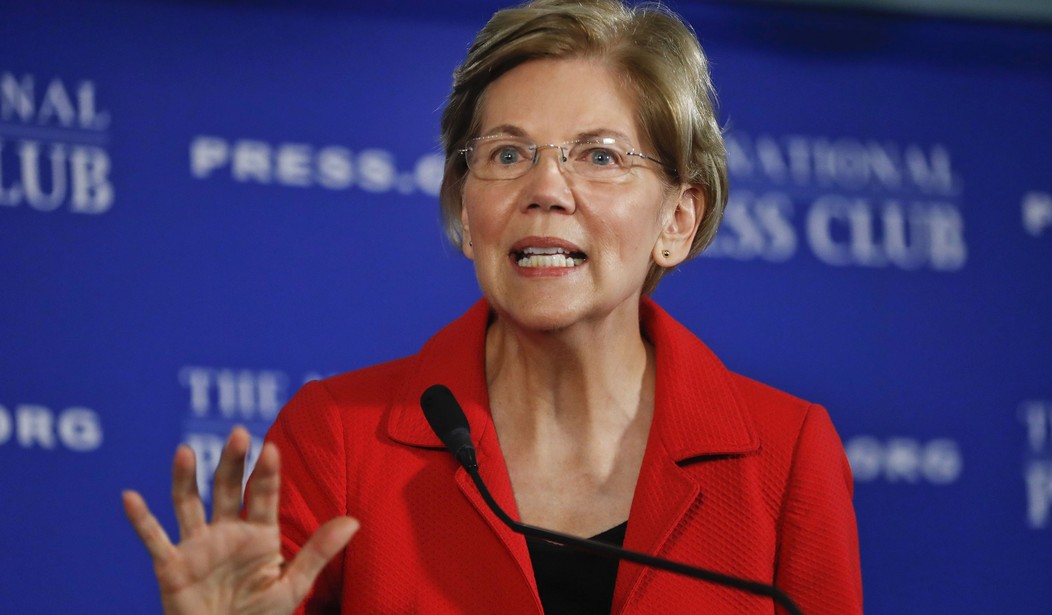Surprise! Donald Trump’s big win on populist economics has reset incentives across the board — and free-traders have been on their heels ever since. It’s no surprise, therefore, that Elizabeth Warren’s new trade policy sounds a lot more similar to Trump’s than to traditional Democratic policies. At least, Politico reports, that’s true in tone if not necessarily specifics:
Elizabeth Warren released a trade plan Monday that’s closer to Donald Trump’s agenda than Barack Obama’s.
The sweeping trade agenda, posted on Medium ahead of a town hall in Toledo, Ohio, on Monday evening, channels many of the critiques of American trade policy from the left over the past several decades, especially from environmental and labor groups. The approach embraces some of Trump’s protectionist rhetoric and would amount to a dramatic shift in trade policy from Democratic administrations such as the Obama and Bill Clinton White Houses, as well as the George W. Bush administration. …
Taken together, Warren’s mandates would fundamentally change American trade policy, potentially excluding many countries that would see the requirements as too onerous and transforming existing trade relationships. Warren’s policies would also likely face resistance in Congress from Republicans opposed to her environmental standards and from more moderate, trade-friendly Democrats.
Two years ago, Democrats were aghast at Trump’s decision to tear up existing trade agreements (NAFTA), torpedo developing ones (Trans-Pacific Partnership), and start trade wars with China, Europe, Mexico, Canada, and anyone else. After watching Trump succeed to some extent with this pugilistic attitude on trade — in some cases, anyway — the political incentives have clearly changed away from the status quo ante. In a sense, this is an Overton Window effect; Trump made it cool to abrogate trade agreements, and that suits populists and progressives alike.
In her Medium post, Warren bolded her core message on trade that, except for the phrase “climate change,” looks like it could have been issued on White House stationery:
We need to completely transform our approach to trade. America enters into trade negotiations with enormous leverage because America is the world’s most attractive market. As President, I won’t hand America’s leverage to big corporations to use for their own narrow purposes — I’ll use it to create and defend good American jobs, raise wages and farm income, combat climate change, lower drug prices, and raise living standards worldwide. We will engage in international trade — but on our terms and only when it benefits American families.
Warren tries to differentiate herself from Trump in style and mood, but it’s not terribly convincing. The argument itself begs the point — that she’s trying to out-Trump Trump:
My plan is a new approach to trade — one that is different from both the Washington insider consensus that brought us decades of bad trade deals and from Donald Trump’s haphazard and ultimately corporate-friendly approach.
Unlike the insiders, I don’t think “free trade” deals that benefit big multinational corporations and international capital at the expense of American workers are good simply because they open up markets. Trade is good when it helps American workers and families — when it doesn’t, we need to change our approach. And unlike Trump, while I think tariffs are an important tool, they are not by themselves a long-term solution to our failed trade agenda and must be part of a broader strategy that this Administration clearly lacks.
Oh, Trump has a broader strategy, all right. He wants to end outsourcing as much as possible and demand reciprocal adherence to trade rules, and with China, Trump wants to reduce the national-security threat from their trade practices. To the extent that American corporations cooperate with that strategy, it can be called “corporate-friendly.” Ask Google and Apple just how “corporate-friendly” they find Trump’s trade policies to be at the moment, though.
The difference is in the agendas for which this pugnacious approach will be utilized. That certainly will be different, as will some of the mechanisms. Warren’s are a bit … puzzling:
Major elements of Warren’s trade proposal include:
- Public disclosure of draft agreement texts throughout the negotiation process, not merely after a deal is reached and sent to Congress for a vote.
- An expanded roster of advisory groups to U.S. negotiators beyond corporate and trade representatives to include a panel representing consumers, one representing rural areas and one for each region of the country.
- Use of “fast-track” consideration by Congress, which requires an up-or-down vote without amendments, only when advisory groups unanimously endorse a trade deal as beneficial.
- Higher labor, human rights and environmental standards for the countries the U.S. negotiates with as a condition of reaching a trade agreement.
- A new “border carbon adjustment” tax on imported goods made by corporations that shift production to countries with weaker greenhouse gas emissions standards.
- An end to “investor-state dispute settlement” arbitration that allows corporations to challenge laws enacted by countries on grounds that they violate trade deals the countries have signed.
What kind of populism is this? At least when Trump engages in trade wars, he’s doing so on behalf of America. Why prevent companies from filing suit when other countries cheat us? And why should “advisory groups” overrule Congress when it comes to allowing the executive branch fast-track authority? No one elected “advisory groups,” and democracy isn’t based on unanimous anything. As president, Warren could simply not request or utilize fast-track authority, right?
Get ready for more of this, though. For too long, political establishments in both parties ignored the anger and frustration that globalization created as manufacturing dissipated in the US. Trump understood that better than most, and now the pendulum is coming back in the other direction. It has the risk of creating an even more impermeable establishment in its wake, and Warren’s trade mechanisms are a big red flag.







Join the conversation as a VIP Member